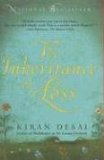Summary | Excerpt | Reading Guide | Reviews | Beyond the Book | Readalikes | Genres & Themes | Author Bio

Could fulfillment
ever be felt as deeply as loss? Romantically she decided that love must
surely reside in the gap between desire and fulfill-ment, in the lack,
not the contentment. Love was the ache, the anticipation, the retreat,
everything around it but the emotion itself.
The water boiled and the cook lifted the kettle and emptied it into the teapot.
“Terrible,”
he said. “My bones ache so badly, my joints hurt—I may as well be dead.
If not for Biju. . . .” Biju was his son in America. He worked at Don
Pollo—or was it The Hot Tomato? Or Ali Baba’s Fried Chicken? His father
could not remember or understand or pronounce the names, and Biju
changed jobs so often, like a fugitive on the run—no papers.
“Yes,
it’s so foggy,” Sai said. “I don’t think the tutor will come.” She
jigsawed the cups, saucers, teapot, milk, sugar, strainer, Marie and
Delite biscuits all to fit upon the tray.
“I’ll take it,” she offered.
“Careful,
careful,” he said scoldingly, following with an enamel basin of milk
for Mutt. Seeing Sai swim forth, spoons making a jittery music upon the
warped sheet of tin, Mutt raised her head. “Teatime?” said her eyes as
her tail came alive.
“Why is there nothing to eat?” the judge
asked, irritated, lifting his nose from a muddle of pawns in the center
of the chessboard.
He looked, then, at the sugar in the pot:
dirty, micalike glinting granules. The biscuits looked like cardboard
and there were dark finger marks on the white of the saucers. Never
ever was the tea served the way it should be, but he demanded at least
a cake or scones, macaroons or cheese straws. Something sweet and
something salty. This was a travesty and it undid the very concept of
teatime.
“Only biscuits,” said Sai to his expression. “The baker left for his daughter’s wedding.”
“I don’t want biscuits.”
Sai sighed.
“How dare he go for a wedding? Is that the way to run a business? The fool. Why can’t the cook make something?”
“There’s no more gas, no kerosene.”
“Why
the hell can’t he make it over wood? All these old cooks can make cakes
perfectly fine by building coals around a tin box. You think they used
to have gas stoves, kerosene stoves, before? Just too lazy now.”
The
cook came hurrying out with the leftover chocolate pudding warmed on
the fire in a frying pan, and the judge ate the lovely brown puddle and
gradually his face took on an expression of grudging pudding
contentment.
They sipped and ate, all of existence passed over
by nonexistence, the gate leading nowhere, and they watched the tea
spill copious ribbony curls of vapor, watched their breath join the
mist slowly twisting and turning, twisting and turning.
Nobody
noticed the boys creeping across the grass, not even Mutt, until they
were practically up the steps. Not that it mattered, for there were no
latches to keep them out and nobody within calling distance except
Uncle Potty on the other side of the jhora ravine, who would be
drunk on the floor by this hour, lying still but feeling himself pitch
about—“Don’t mind me, love,” he always told Sai after a drinking bout,
opening one eye like an owl, “I’ll just lie down right here and take a
little rest—”
They had come through the forest on foot, in leather jackets from the Kathmandu black market, khaki pants, bandanas—universal guerilla fashion. One of the boys carried a gun.
Later
reports accused China, Pakistan, and Nepal, but in this part of the
world, as in any other, there were enough weapons floating around for
an impoverished movement with a ragtag army. They were looking for
anything they could find—kukri sickles, axes, kitchen knives, spades,
any kind of firearm.
Copyright © 2006 by Kiran Desai. Reprinted with permission from Grove Atlantic, Inc. All rights reserved.






Your guide toexceptional books
BookBrowse seeks out and recommends the best in contemporary fiction and nonfiction—books that not only engage and entertain but also deepen our understanding of ourselves and the world around us.